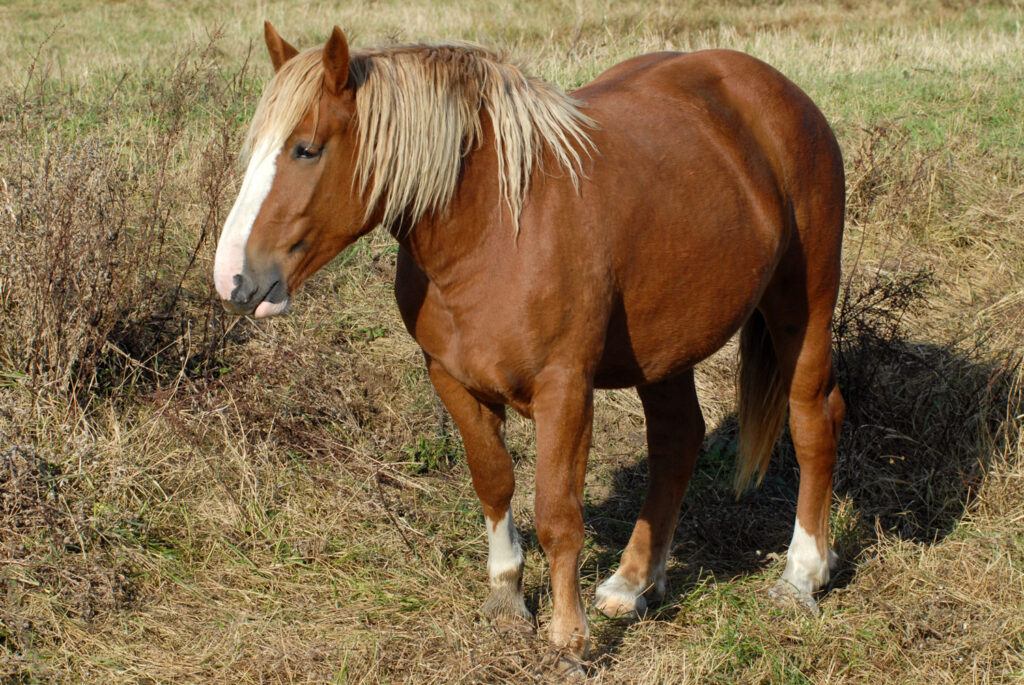
Horse owners are constantly worried about equine nutrition and are they feeding their horses correctly. Veterinarians know the contents of the equine diet have significant impact on general health due to effects on multiple functions of the digestive tract—the intestinal microbiome, gastrointestinal barriers, digestion and absorption of nutrients, and particle size and proportions of volatile fatty acids.
An Italian study compared the effects of high starch versus high fiber dietary components on dry matter content in various compartments of the bowel. They also evaluated effects on particle size and volatile fatty acid composition within the gut contents [Raspa, F.; Vervuert, I.; Capucchio, M.T.; et al. A high-starch vs. high-fiber diet: Effects on the gut environment of the different intestinal compartments of the horse digestive tract. BMC Veterinary Research 2022, 18:187; doi.org/10.1186/s12917-022-03289-2].
The study included 19 Bardiagiano horses that were approximately 14 months of age and were destined for slaughter. They were divided into two groups: a) one group fed 57% starch-rich pelleted feed and 9.43% hay; and b) one group fed 30% high-fiber pellets and 70% hay. The high-starch diet had 10 times as much starch as the high-fiber diet.
Previous studies have identified reduced water content in the digesta of the right dorsal colon when horses are fed large grain rations compared to only hay. This current study corroborated previous findings that a high-starch diet results in a higher percentage of dry matter (DM) in the right dorsal colon compared to a high-fiber diet. Higher levels of volatile fatty acids when fed high-starch occur in all hindgut compartments, and these lead to increased sodium and water absorption by the colonic mucosa. Large amounts of cereal grains elicit water absorption from the colon further leading to post-prandial dehydration. Forage within the gastrointestinal tract is known to hold water. With less forage intake and a lower fiber diet, horses consume less water and intestinal contents are more dehydrated.
One volatile fatty acid—butyrate—is derived from fiber fermentation and is known to promote health of colonocytes. Butyrate levels were higher in the high-fiber diet group in the cecum, pelvic flexure and right dorsal colon. Valeric acid levels, produced from lactate, were found in the high-starch group; no valeric acid was found in the high-fiber group. Valeric acid is able to penetrate intestinal mucosa and could contribute to development of gastric ulcers.
A higher proportion of large (>8 mm) and small (<1 mm) particles were obtained from fecal samples in horses fed a high-starch diet compared to a high-fiber diet. Horses on high-starch feed have a more homogenous and dense makeup compared to a hay-only diet. Undigested starch spills over into the large colon and alters the microbiome sufficiently to reduce the activity of fiber-digesting microorganisms. The particles in a predominantly hay diet range from 2-4 mm. Particle size is dependent on chewing and dental health as well as diet, but in this study of young horses, the only different parameter was diet. Adequate digestion of fiber is related to reduction of particle retention in the intestines, hence retention of large particles increases the potential for large colon impaction.
The authors concluded, “A fiber-based diet should be promoted in horses to avoid causing alterations in dry matter, volatile fatty acids and particle size composition in order to safeguard gut health in horses.”








